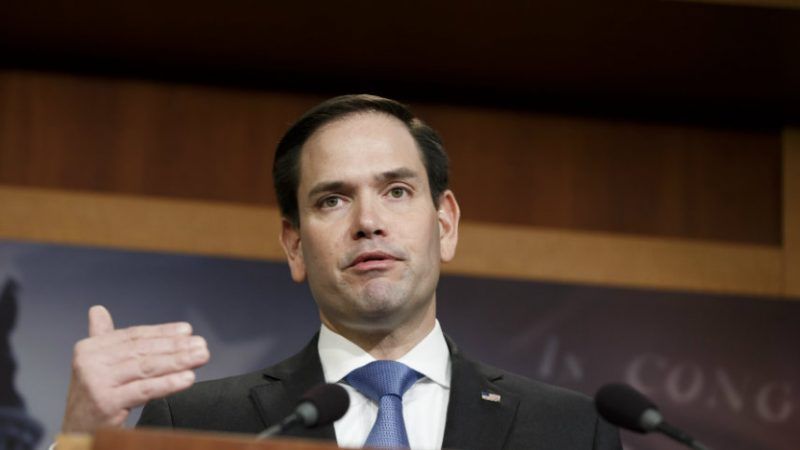Marco Rubio Admits 'I Was Wrong' About Occupational Licensing. Now, He's Pushing Reforms.
Rubio and Elizabeth Warren are teaming up to stop states from restricting occupational licenses for people with unpaid student loan debt.

It is rare to see a politician admit that he or she was wrong. That's why Sen. Marco Rubio's (R-Fla.) tweet on Thursday morning was so refreshing.
While in #Florida legislature I voted for a bill that allowed state to suspend professional licenses of those who defaulted on student loans. I WAS WRONG. Today I filed a bill with @SenWarren to fix this. How can they pay back if they can't work? #Sayfie https://t.co/fcbJUkJ6BJ
— Marco Rubio (@marcorubio) June 14, 2018
Just as refreshing is the bipartisan effort to fix a particularly galling aspect of America's occupational licensing problem. Rubio is teaming up with Sen. Elizabeth Warren (D-Mass.) on a bill that would prohibit states from suspending professional and occupational licenses if a license-holder defaults on their student loan payments. Warren, in a statement, called those rules "wrong and counterproductive."
"It makes no sense to revoke a professional license from someone who is trying to pay their student loans," says Rubio. "Our bill would fix this 'catch-22' and ensure that borrowers are able to continue working to pay off their loans."
If it becomes law, the Protecting Job Opportunities for Borrowers (Protecting JOBs) Act would prevent states from suspending, revoking or denying state professional licenses solely because borrowers are behind on their federal student loan payments. The federal government has the authority to order states to do that, Rubio says, because of the Higher Education Act, a federal law that, among other things, require states to offer in-state tuition rates to members of the military. The bill also gives borrowers a legal recourse if states refuse to comply.
An analysis by The New York Times last year found that at least 20 states had rules on the books allowing licensing agencies to deny or revoke professional and occupational licenses from individuals who defaulted on student loan debt. The Times found more than 8,700 cases in which individuals had lost their licenses, though the actual number is likely much higher due to the decentralized and often obfuscated nature of licensing boards.
Sure, it's important to incentivize the repayment of student loans, but that hardly seems to justify a punishment that literally means denying someone the right to do their job legally. And with licenses required for more than 25 percent of all jobs in America, falling behind on student loan payments can close off a wide range of potential careers.
There is no logic to such laws. For individuals who are already struggling to repay debts, their situation will only get worse if they cannot continue working.
"These policies don't make sense, because they make it even harder for people to put food on the table and get out of debt," said Warren.
Though licensing is largely a state issue, the federal government is partially to blame for these state-level policies. In 1990, the Department of Education recommended that states "deny professional licenses to defaulters until they take steps to repayment." That year defaulted student loans totaled about $7.8 billion. Last year the figure topped $32 billion.
As Rubio admitted in his tweet Thursday morning, he voted for a law allowing Florida occupational licensing boards to suspend licenses for individuals who defaulted on student loans. But he has a personal reason for changing his opinion. Rubio graduated from law school in 1996, and revealed in a 2012 speech that it took him more than 15 years to pay off more than $150,000 in student loan debt that he'd accumulated while pursuing his degrees.
For many others—particularly low- and middle-income professions where occupational licensing can already be a major hurdle to gainful employment—that sort of debt could make it impossible to work in a licensed profession.
Sticking to a policy to avoid looking like you've flip-flopped is a major impediment to fixing bad policy in particular. Indeed, doing so is really an act of cowardice. More politicians should be willing to show the kind of bravery that Rubio put on display Thursday.


Show Comments (32)